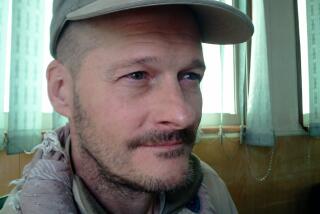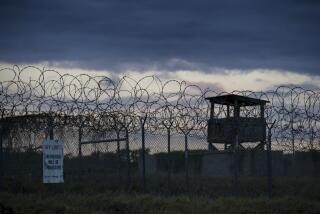Iraq Releases U.S. Worker It Had Seized
WASHINGTON — Iraq bowed to U.S. demands Saturday and released an American bomb-disposal expert seized by a military patrol Thursday, ending Bush Administration fears that the incident might embroil the United States in a new international confrontation just weeks before the election.
Chad Hall, a munitions specialist working for a U.S. firm, was turned over to U.N. custody in Baghdad and was to be flown to Kuwait today, said Abdul-Latif Khabbaj, a spokesman for the U.N. Iraq-Kuwait Observer Mission.
“He’s in good health,” Khabbaj told the Associated Press in Kuwait.
The release followed intensive diplomatic pressure on Iraq by the Administration, which was concerned that the capture of the 50-year-old American might leave it facing another “hostage situation” similar to the Iran hostage drama that dogged former President Jimmy Carter in 1980.
Hall was captured at gunpoint by an Iraqi security patrol while on Kuwaiti soil about a mile from U.N. mission headquarters. Hall is a supervisor for a Lexington, Ky., firm on contract to the Kuwaiti government to remove unexploded bombs and mines from the area.
His release was made public in a statement by the Iraqi Information Ministry early Saturday. The two-paragraph announcement hinted that the arrest may have been a mistake.
“Iraqi authorities had investigated the issue of . . . Hall’s arrest throughout the last 24 hours and concluded that certain confusion had led to his arrest by an Iraqi officer,” the document said. It carefully omitted any sign of an apology.
The State Department reacted cautiously Saturday to word of Hall’s release. A spokesman confirmed that U.S. authorities understood he had been turned over to U.N. representatives but said that the Administration would have no comment until today, after he was to have left Iraq.
The motive for Hall’s capture was not immediately clear.
The territory where he was arrested, part of a demilitarized zone, belonged to Iraq until May, when a U.N. commission redefined the border following the Persian Gulf War. Baghdad has refused to recognize the new boundary.
Officials of Hall’s company said that he was seized after intervening in a dispute between Iraqi soldiers and two of the firm’s Pakistani employees over whether the territory belonged to Iraq or Kuwait.
The firm said that Hall had suggested the Iraqis contact U.N. headquarters to clear up the matter.
With the U.S. election now less than a month away, there has been suspicion in Washington that Iraqi President Saddam Hussein has been trying to influence the outcome.
Hall’s seizure came as the United Nations was about to decide on a formal request by Baghdad for a suspension of further U.N. inspections of Iraqi weapons until after the U.S. election.
Baghdad said that it feared President Bush might provoke a fight to help himself politically. The President has been lagging behind in all the major public opinion polls.
On Friday, however, U.N. officials denied Baghdad’s request and instead announced plans to send an inspection mission to Iraq on Friday, with a larger-than-usual team of experts.
State Department officials said that the Iraqi army has periodically sent patrols across the unmarked border with Kuwait--apparently in violation of the cease-fire agreement that ended the Gulf War--and has arrested other Westerners who have blundered into Iraqi territory.
Americans seized in the area just after the Gulf War cease-fire in February, 1991, were imprisoned for periods ranging from a few days to a month, but a Briton and three Swedes who were captured more recently were sentenced to seven years in prison.
Some analysts contend that Baghdad has not always been aware of arrests by its patrols in remote areas.
Because the border area is not marked, there are frequent clashes between Kuwaiti and Iraqi police.
Hall’s brother, Gerald, who works for Bechtel Co. in Kuwait, told the Associated Press that he was thrilled to hear that his brother had been set free.
“That is the best news I’ve heard all day,” he said.
More to Read
Sign up for Essential California
The most important California stories and recommendations in your inbox every morning.
You may occasionally receive promotional content from the Los Angeles Times.










